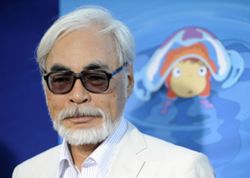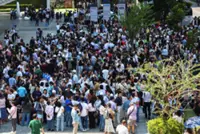
Students sit in a classroom at a school in the early morning following an announcement of the reopening of schools by the authorities, after the ousting of Syria’s Bashar al-Assad, in Damascus, Syria December 15, 2024. REUTERS/Ammar Awad
DAMASCUS/LATAKIA, Syria (Reuters) -Syrian Christians attended regular Sunday services for the first time since the dramatic overthrow of President Bashar al-Assad a week ago, in an early test of assurances by the new Islamist rulers that the rights of minorities will be protected.
As the Islamist group Hayat Tahrir al-Sham (HTS) swept to power last week, it sought to reassure Syria's minority groups that their way of life would not be at risk.
Before Assad fell, historic religious minority groups, including Christians, worshipped freely and some remain jittery at the prospect of an Islamist government.
Streets in the heavily Christian Damascus neighbourhood of Bab Touma filled with worshippers returning from church on Sunday morning but some struck a note of caution.
"We're scared, we're still scared," said local resident Maha Barsa after attending Mass at the local Greek Melkite Catholic church.
Barsa said she had barely left her home since HTS took over one week ago, though she said that nothing had happened to warrant her concern, adding: "Things are ambiguous."
In the coastal city of Latakia, long an Assad stronghold, Lina Akhras, a parish council secretary at the St George Greek Orthodox Cathedral, said on Sunday that Christians had been "comfortable" under his rule in terms of freedom of belief but that they just wanted to live in peace and harmony.
"(Assad's fall) happened all of a sudden, we didn't know what to expect... Thank God, we received a lot of assurances and we saw that members of the (HTS) committee reached out to our priest," she told Reuters.
"God willing, we will return to our previous lives and live in our beautiful Syria," Akhras added.
Syria is home to multiple ethnic and religious minorities including Christians, Armenians, Kurds and Shi'ite Muslims. The Assad family itself belongs to the minority Alawite faith, an offshoot of Shi'ite Islam, in Sunni Muslim-majority Syria.
Tens of thousands of mostly Shi'ite Muslims have fled Syria for Lebanon in the last week out of fear of persecution by the country's new rulers, a senior Lebanese security official told Reuters last week.
The protection of Syria's minorities was a key concern on Saturday when top diplomats from Arab nations, Turkey, the United States and European Union met in Jordan.
U.S. Secretary of State Antony Blinken said they backed an inclusive and representative government that would respect minority rights and not offer "a base for terrorist groups".
SCHOOLS REOPEN
Syrian students also returned to classrooms on Sunday after the new rulers ordered schools reopened in another potent sign of some normalcy.
The country's new de facto leader, Ahmad al-Sharaa, faces a massive challenge to rebuild Syria after the civil war, in which hundreds of thousands were killed. Cities were bombed to ruins, the economy was gutted by international sanctions and millions of refugees still live in camps outside Syria.
Officials said most schools were opening around the country on Sunday, the first day of the working week. However, some parents were not sending their children to class due to uncertainty over the situation.
Pupils waited cheerfully in the courtyard of a boys' high school in Damascus on Sunday morning and applauded as the school secretary, Raed Nasser, hung the flag adopted by the new authorities.
In one classroom, a student pasted the new flag on a wall.
"I am optimistic and very happy," said student Salah al-Din Diab. "I used to walk in the street scared that I would get drafted to military service. I used to be afraid when I reach a checkpoint."
ENDING SANCTIONS?
As Syria starts trying to rebuild, its neighbours and other foreign powers are still working out a new stance on the country, a week after the collapse of the Assad government that was backed by Iran and Russia.
Sharaa - better known by his rebel nom de guerre Abu Mohammed al-Golani - leads the Hayat Tahrir al-Sham (HTS), the Islamist group that swept Assad from power last week. HTS is a group formerly allied with al-Qaeda that is designated a terrorist organization by many governments, and is also under United Nations sanctions.
U.N. Syria envoy Geir Pedersen said on Sunday he hoped for a swift end to the sanctions to help facilitate economic recovery.
"We will hopefully see a quick end to sanctions so that we can see really rallying around building up Syria," Pedersen said as he arrived in Damascus to meet Syria's caretaker government and other officials.
In a statement, the Syrian ruling General Command said Sharaa discussed with Pedersen the need to reconsider a roadmap outlined by the Security Council for the country in 2015, known as U.N. Security Council Resolution 2254.
Blinken has said the transition in Syria should lead to "credible, inclusive, and non-sectarian governance" consistent with U.N. Security Council Resolution 2254.
That resolution calls for a Syrian-led process facilitated by the United Nations, establishing within six months non-sectarian governance and setting a schedule for a process of drafting a new constitution. It also calls for free and fair elections.
(Reporting by Timour Azhari in Damascus, Tuvan Gumrukcu and Umit Bektas in LatakiaWriting by Andrew Mills, Frances Kerry and Idrees Ali. Editing by Gareth Jones and Deepa Babington)






































